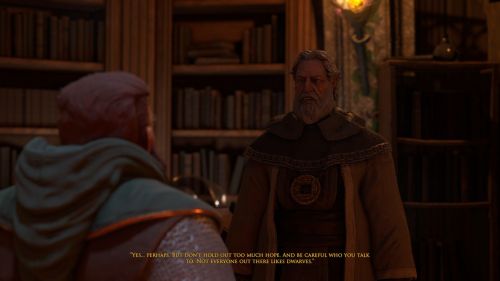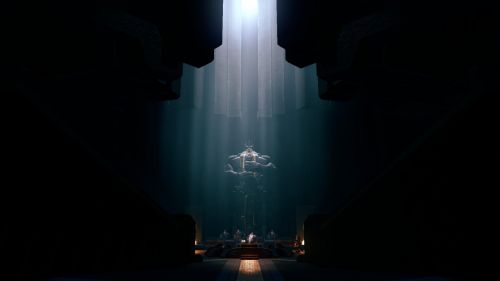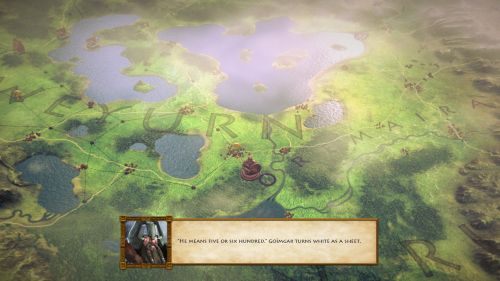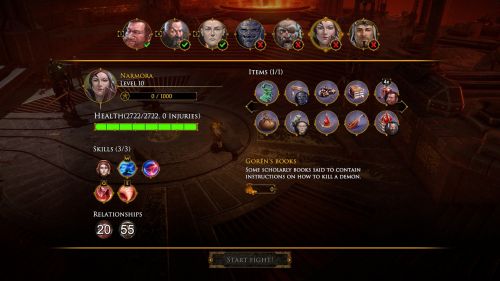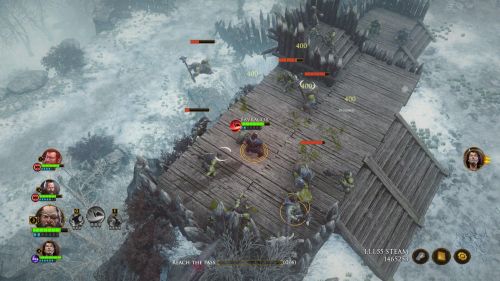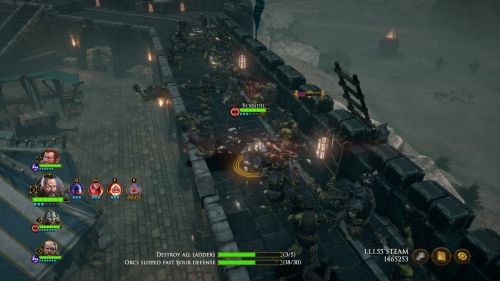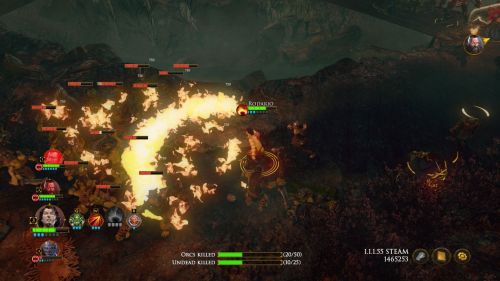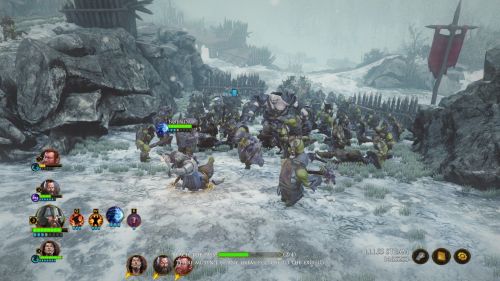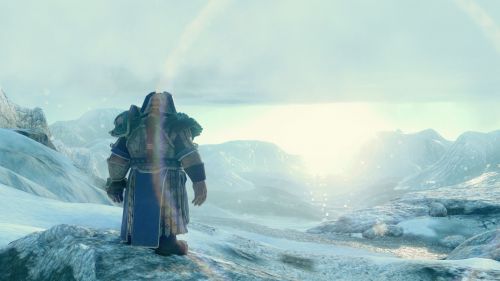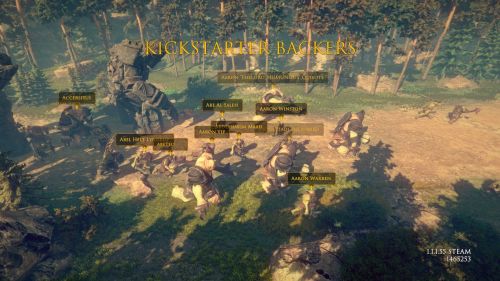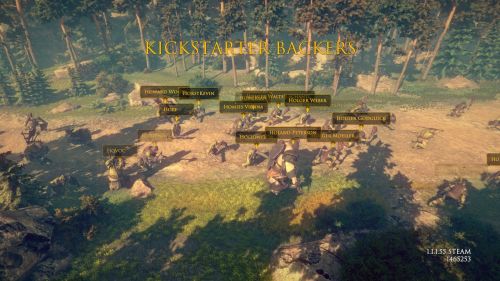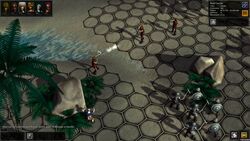RPG Codex Review: The Dwarves
RPG Codex Review: The Dwarves
Review - posted by Infinitron on Wed 21 December 2016, 23:52:22
Tags: KING Art Games; The DwarvesLast July, the world learned that KING Art Games, the eclectic German game development studio best known for their Book of Unwritten Tales series of adventure games, were working on a horde combat-focused RPG called The Dwarves, based on a German series of fantasy novels of the same name. The game was Kickstarted that September and released this December, exactly 15 months later. The Dwarves wasn't really the Codex's type of game and we hadn't paid much attention to it, but Bubbles' Gamescom visits kept it on our radar. A week before the game's release, we were able to acquire a review key, which was snatched up by talented contributor sser. We've had an unprecedented backlog of content this winter and some of you will be aware by now that The Dwarves has not reviewed well elsewhere. Unfortunately, our review offers no surprises:
Read the full article: RPG Codex Review: The Dwarves
The Dwarves’ combat is mostly as advertised: it’s a whole lot of orcs colliding with a few dwarves and bodies don’t stay grounded for long. When it works, it looks great. You feel a momentum to the crowds of combatants and the weight of your crushing, bashing, upheaving abilities. Characters use abilities on cooldown (the horror) and have a limited amount of regenerating AP that must be expended carefully as your ‘warriors’ are amusingly unthreatening when left without. Action flows in real-time, though you'll often spend most of it pausing to assign orders and activate items.
And everything in The Dwarves is about crowd control. The best of it is knocking enemies off cliffs, obviously, but when high altitudes aren’t available you must commit to bad attitudes (oh god why). Managerial crowd control is necessary to properly batter and bash a group of misunderstood peaceniks. Enemies need to be kept bashed away, off their feet, or stunned so as to prevent your fighters from being overwhelmed. The mechanics to thin out the waves of enemies tie directly into all this CC: viridian villains take extra damage if stunned or are instantly killed if you strike at them while they’re on the ground. Your tougher enemies will be complaining on the forums as you constantly CC them into haplessness. Sometimes you can combine abilities, like bashing enemies into one spot and then gassing them. Sometimes, the chaos of the battles gets too crazy and you accidentally charge off a bridge or smash an allied character in the face.
Unfortunately, it just does not always work.
Most scenarios are simply poorly designed, oddly reminiscent of the sort of amateur attempts found on a Starcraft UMS. The battlefields are short and mowed through all-too quickly. Nice ideas, very poor execution. A great example is a snow map in which there are crevices, cliff sides, fortifications, and an army of orcs crashing down on you. My first few attempts at this map had me desperately using all the resources I had: spreading my dwarves out, using combinations, pausing constantly to queue up new orders. And I failed. Repeatedly. After coasting through so many battles, I thought I’d finally found the point in the game where it was going to turn up the heat.
Then I realized my objective was just to reach the edge of the map. This battlefield was fairly large with three branching points, but I only needed to get to one. So, what did I do? Well, your fighters can naturally push through enemies when they move so I gathered all my dwarves and simply walked through the orc hordes to the exit zone and promptly won. This theme of expedited endings is shockingly constant through The Dwarves. In far too many battles you can shortcut your way to a victory ostensibly due to a lack of foresight by the designers, why else would so many assets go virtually untouched?
The characters themselves also have so little balance done – some are absolute shit while others can carry the team singlehandedly. Combine an all-star team with a few of these wonky scenarios and you can quickly start zooming right through battles (playtime: a generous 9 hours). One feature slotted in seemingly for no reason is a ‘friends’ meter on your characters. Blandly displayed by an undescribed number on the character sheets, if fighters are friendly with one another they’ll acquire AP at a quicker rate. Honestly, I never noticed this having any effect and threw my squads together regardless of their being Facebook friend status. The items and abilities are similarly imbalanced. Some are completely worthless while others are gamebreaking. For example, one character has a single-target, low damage “stab.” For the same amount of AP, you can do an AOE that does damage in a huge cone and simultaneously sends enemies scattering on fire. Letter opener pin prick vs. napalming greenskins. Not once did I find myself weighing out the pros and cons of these things.
Speaking of enemies, there is not much variety on that front. You will mostly face orcs, surprise surprise. The orcs themselves really do not work that hard to differentiate themselves despite an ostensible ranking system. Aside from the larger ogres, I never really found myself identifying specific threats. A few other enemy types appear now and again, but I never noticed. There is a horsey type of enemy that skates across surfaces like a primadonna making the game look real fucking bad. And a couple of bosses that do the same. To the game’s credit, one of the primary villains is spookily imposing, but like a lot of fantasy idiots he’s frequently monologuing in place of murdering.
I so desperately wanted the game to just give me awesome, large, and environmentally varied battlefields to fight and survive on. Unfortunately, most scenarios are condensed into one spot and the few that find ‘range’ probably only feel long by comparison. It would have been well served by the huge scope of, say, a Freedom Force style of map where you travel large distances across varied terrain. Freedom Force had tightly designed resource usage and maps could be genuinely grueling. You’d get to the end of them with a battered squad of heroes, just surviving by the skin of your teeth. The Dwarves frequently fights in a Smash T.V.-esque phonebooth and all too rarely captures a sense of struggle despite, visually, doing a great job of making you feel hopelessly outnumbered. As the game rushes to its conclusion you are given some genuinely chaotic battlefields, but even then it just felt hamstrung. You fight one boss on the edge of a cliff about the size of a shoebox. Because The Dwarves looks its worst on these small-scale fights, this dramatic battle ended up looking more like a grade school play than the bombastic world-changer it was supposed to be.
And everything in The Dwarves is about crowd control. The best of it is knocking enemies off cliffs, obviously, but when high altitudes aren’t available you must commit to bad attitudes (oh god why). Managerial crowd control is necessary to properly batter and bash a group of misunderstood peaceniks. Enemies need to be kept bashed away, off their feet, or stunned so as to prevent your fighters from being overwhelmed. The mechanics to thin out the waves of enemies tie directly into all this CC: viridian villains take extra damage if stunned or are instantly killed if you strike at them while they’re on the ground. Your tougher enemies will be complaining on the forums as you constantly CC them into haplessness. Sometimes you can combine abilities, like bashing enemies into one spot and then gassing them. Sometimes, the chaos of the battles gets too crazy and you accidentally charge off a bridge or smash an allied character in the face.
Unfortunately, it just does not always work.
Most scenarios are simply poorly designed, oddly reminiscent of the sort of amateur attempts found on a Starcraft UMS. The battlefields are short and mowed through all-too quickly. Nice ideas, very poor execution. A great example is a snow map in which there are crevices, cliff sides, fortifications, and an army of orcs crashing down on you. My first few attempts at this map had me desperately using all the resources I had: spreading my dwarves out, using combinations, pausing constantly to queue up new orders. And I failed. Repeatedly. After coasting through so many battles, I thought I’d finally found the point in the game where it was going to turn up the heat.
Then I realized my objective was just to reach the edge of the map. This battlefield was fairly large with three branching points, but I only needed to get to one. So, what did I do? Well, your fighters can naturally push through enemies when they move so I gathered all my dwarves and simply walked through the orc hordes to the exit zone and promptly won. This theme of expedited endings is shockingly constant through The Dwarves. In far too many battles you can shortcut your way to a victory ostensibly due to a lack of foresight by the designers, why else would so many assets go virtually untouched?
The characters themselves also have so little balance done – some are absolute shit while others can carry the team singlehandedly. Combine an all-star team with a few of these wonky scenarios and you can quickly start zooming right through battles (playtime: a generous 9 hours). One feature slotted in seemingly for no reason is a ‘friends’ meter on your characters. Blandly displayed by an undescribed number on the character sheets, if fighters are friendly with one another they’ll acquire AP at a quicker rate. Honestly, I never noticed this having any effect and threw my squads together regardless of their being Facebook friend status. The items and abilities are similarly imbalanced. Some are completely worthless while others are gamebreaking. For example, one character has a single-target, low damage “stab.” For the same amount of AP, you can do an AOE that does damage in a huge cone and simultaneously sends enemies scattering on fire. Letter opener pin prick vs. napalming greenskins. Not once did I find myself weighing out the pros and cons of these things.
Speaking of enemies, there is not much variety on that front. You will mostly face orcs, surprise surprise. The orcs themselves really do not work that hard to differentiate themselves despite an ostensible ranking system. Aside from the larger ogres, I never really found myself identifying specific threats. A few other enemy types appear now and again, but I never noticed. There is a horsey type of enemy that skates across surfaces like a primadonna making the game look real fucking bad. And a couple of bosses that do the same. To the game’s credit, one of the primary villains is spookily imposing, but like a lot of fantasy idiots he’s frequently monologuing in place of murdering.
I so desperately wanted the game to just give me awesome, large, and environmentally varied battlefields to fight and survive on. Unfortunately, most scenarios are condensed into one spot and the few that find ‘range’ probably only feel long by comparison. It would have been well served by the huge scope of, say, a Freedom Force style of map where you travel large distances across varied terrain. Freedom Force had tightly designed resource usage and maps could be genuinely grueling. You’d get to the end of them with a battered squad of heroes, just surviving by the skin of your teeth. The Dwarves frequently fights in a Smash T.V.-esque phonebooth and all too rarely captures a sense of struggle despite, visually, doing a great job of making you feel hopelessly outnumbered. As the game rushes to its conclusion you are given some genuinely chaotic battlefields, but even then it just felt hamstrung. You fight one boss on the edge of a cliff about the size of a shoebox. Because The Dwarves looks its worst on these small-scale fights, this dramatic battle ended up looking more like a grade school play than the bombastic world-changer it was supposed to be.
Read the full article: RPG Codex Review: The Dwarves
[Review by sser]
The Dwarves – Review
Playtime: 9 hours (at best)
Engine: Unity Engine 5.4 (fuck)
Crashes: 3-crashes/freezes
Disclaimer: free key
For being cornerstones of the fantasy genre, it is a bit surprising how little ‘play’ Dwarves see in gaming. They’re virtually never main characters and they seem to share the same personality across many mediums: “Oh ho ho, don’t look down at me, I’m an alcoholic blue collar worker from fantasy Alaska, all Elves are East Coast sissies and magic is for Mary Sues.”
World of Warcraft’s demographics show that dwarves are one of the least popular races despite being a mainstay. It’s strange because, in a way, Dwarves are essentially the Navy SEALs of the fantasy genre. They’re always outnumbered and fighting against the odds. One dwarf is worth the lives of a hundred enemies. Well, good news disgusting dwarf-lovers, you now have two Dwarf-games to try out: We are the Dwarves, a quasi-Commandos game based on three dwarves who utilize stealth and surprise to defeat their enemies, and The Dwarves…
Loosely Based on True Events
The setting of The Dwarves comes from a series of novels I’ve not read and never will. However, a little bit of research shows that they’re very popular and that The Dwarves’ plot is virtually identical to the first book, titled, The Dwarves.
You are Tungdil Goldhand, a lone dwarf in the human realm of Ionandar in a world filled with Norse-names or Indian ones spelled backwards. The premise of the story is that you’re an educated blacksmith with zero world experience. Carrying some serious adventure-blue balls, and despite having not slain even a single cellar rat, you happily set out on a delivery quest that goes clear across the entire world.
Without any problems, you deliver the mail and take home a collection of rare baseball stamps. Just kidding, bad guys kill literally everyone you know and love and a crazed Alf is dead-set on culturally enriching the entire neighborhood with greenskins.
Luckily for you, the game’s title is a plurality and you are soon joined by a couple of bros in Boendal and Biondil. With their help, and a bunch of friendly and not so friendly characters to come, you’ll traipse around finding danger and being real reluctant about everything, yet learning a lot in the process, until you finally become an awkward badass who has redeemed himself through gore and violence.
Black Griffin Down
The general conceit of The Dwarves is that you take up to four characters and battle it out with dozens of enemies, using the environment and powerful abilities to even the playing field. While you have potentially up to a dozen or more characters in your party, you only use four in the battles. Each character has a passive and can choose up to three skills from a pool of options. As far as I could tell, characters gained XP regardless of whether or not they participated in the battles so there’s little worry about incidentally leaving some heroes behind in terms of power scale.
Between battles, you are shown a large, 3D map with numerous locations connected by predefined routes. Reminiscent of the original Total War series, your party, enemy parties, and merchants are represented by wooden tokens skirting around the map. Almost the entire story is told from this screen: every town you visit, every camping night, etc., sparks text events that further push the tale. The voice actors are all excellent, passing between the characters and a narrator. The sound and music are spot on, hitting all the cinematic marks established in the Lord of the Rings movies. Production-wise, The Dwarves is excellent. It utilizes the source material very well and if one were to argue the game to be good, it’d be on the merit as a sort of visual novel you get to play.
Wait, argue the game to be good? What does that mean –
Yellow Brick Roads to Nowhere
Decisions you make at the start of the game serve only secondary functions later on (if any at all), and the relevance of orc hordes roving around causing chaos quickly disappears. In fact, about halfway through the game there is a roaming orc horde that doesn’t seem to attack anything at all – it just travels from node to node until you smash it. All other combat occurs through proccing story elements. It’s very reminiscent of Dragon Age where the map displays an implied threat, but in reality leaves a very small impression upon the actual gameplay. You even have “provisions” which initially I took to mean travel demanded a sort of Realms of Arkania preparedness, but instead they simply heal your dudes. They’re also consumed whenever you move, regardless of injuries, and not once did provisions prove to be a factor whatsoever. The map does look nice, though, and it gives a tactile feel of travel that might be missing without it. It’s just that by the game’s end I could hardly find a reason to justify its inclusion.
An Inventory from Hell, the Devil sends his gaer.dsr
From the world map, you organize your party with what might be the worst inventory screen ever. Your entire party is listed horizontally and requires scrolling to see them all. The items are cluttered together seemingly at random. You’d have an easier time shopping at a Cuban gas station than picking through this mess. But it gets worse. Each character can use one item. When you give this item to a character, it slaps the character’s portrait onto the item instead of vice versa. You end up having to scroll through the inventory to see who is assigned what items, or rather by the game’s terms, what item is assigned which character.
The Dwarves advertises itself as an RPG, but it requires some extremely liberal, Steam store-page levels of label abuse for that to make sense. Fighters do not gain armor or weapons and, well, here’s the level-up screen:
Yeah. Each character maxes out at ten levels and are given two abilities from which to choose from. None of the abilities are particularly exciting, typically ranging from AOE, single-target, mobility, and buff/debuff. The inventory, interface, and general “RPG-lite” nature of the game is a high dosage of consolization.
Floating Fantasy
The Dwarves’ combat is mostly as advertised: it’s a whole lot of orcs colliding with a few dwarves and bodies don’t stay grounded for long. When it works, it looks great. You feel a momentum to the crowds of combatants and the weight of your crushing, bashing, upheaving abilities. Characters use abilities on cooldown (the horror) and have a limited amount of regenerating AP that must be expended carefully as your ‘warriors’ are amusingly unthreatening when left without. Action flows in real-time, though you'll often spend most of it pausing to assign orders and activate items.
And everything in The Dwarves is about crowd control. The best of it is knocking enemies off cliffs, obviously, but when high altitudes aren’t available you must commit to bad attitudes (oh god why). Managerial crowd control is necessary to properly batter and bash a group of misunderstood peaceniks. Enemies need to be kept bashed away, off their feet, or stunned so as to prevent your fighters from being overwhelmed. The mechanics to thin out the waves of enemies tie directly into all this CC: viridian villains take extra damage if stunned or are instantly killed if you strike at them while they’re on the ground. Your tougher enemies will be complaining on the forums as you constantly CC them into haplessness. Sometimes you can combine abilities, like bashing enemies into one spot and then gassing them. Sometimes, the chaos of the battles gets too crazy and you accidentally charge off a bridge or smash an allied character in the face.
Unfortunately, it just does not always work.
Most scenarios are simply poorly designed, oddly reminiscent of the sort of amateur attempts found on a Starcraft UMS. The battlefields are short and mowed through all-too quickly. Nice ideas, very poor execution. A great example is a snow map in which there are crevices, cliff sides, fortifications, and an army of orcs crashing down on you. My first few attempts at this map had me desperately using all the resources I had: spreading my dwarves out, using combinations, pausing constantly to queue up new orders. And I failed. Repeatedly. After coasting through so many battles, I thought I’d finally found the point in the game where it was going to turn up the heat.
Then I realized my objective was just to reach the edge of the map. This battlefield was fairly large with three branching points, but I only needed to get to one. So, what did I do? Well, your fighters can naturally push through enemies when they move so I gathered all my dwarves and simply walked through the orc hordes to the exit zone and promptly won. This theme of expedited endings is shockingly constant through The Dwarves. In far too many battles you can shortcut your way to a victory ostensibly due to a lack of foresight by the designers, why else would so many assets go virtually untouched?
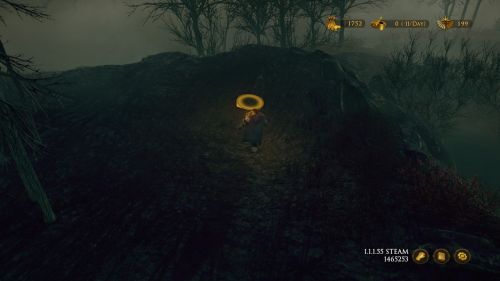
Empty spaces as far as the camera lets you see -- sometimes filled with pixel-finding (yes, you heard that right).
The characters themselves also have so little balance done – some are absolute shit while others can carry the team singlehandedly. Combine an all-star team with a few of these wonky scenarios and you can quickly start zooming right through battles (playtime: a generous 9 hours). One feature slotted in seemingly for no reason is a ‘friends’ meter on your characters. Blandly displayed by an undescribed number on the character sheets, if fighters are friendly with one another they’ll acquire AP at a quicker rate. Honestly, I never noticed this having any effect and threw my squads together regardless of their being Facebook friend status. The items and abilities are similarly imbalanced. Some are completely worthless while others are gamebreaking. For example, one character has a single-target, low damage “stab.” For the same amount of AP, you can do an AOE that does damage in a huge cone and simultaneously sends enemies scattering on fire. Letter opener pin prick vs. napalming greenskins. Not once did I find myself weighing out the pros and cons of these things.
Speaking of enemies, there is not much variety on that front. You will mostly face orcs, surprise surprise. The orcs themselves really do not work that hard to differentiate themselves despite an ostensible ranking system. Aside from the larger ogres, I never really found myself identifying specific threats. A few other enemy types appear now and again, but I never noticed. There is a horsey type of enemy that skates across surfaces like a primadonna making the game look real fucking bad. And a couple of bosses that do the same. To the game’s credit, one of the primary villains is spookily imposing, but like a lot of fantasy idiots he’s frequently monologuing in place of murdering.
I so desperately wanted the game to just give me awesome, large, and environmentally varied battlefields to fight and survive on. Unfortunately, most scenarios are condensed into one spot and the few that find ‘range’ probably only feel long by comparison. It would have been well served by the huge scope of, say, a Freedom Force style of map where you travel large distances across varied terrain. Freedom Force had tightly designed resource usage and maps could be genuinely grueling. You’d get to the end of them with a battered squad of heroes, just surviving by the skin of your teeth. The Dwarves frequently fights in a Smash T.V.-esque phonebooth and all too rarely captures a sense of struggle despite, visually, doing a great job of making you feel hopelessly outnumbered. As the game rushes to its conclusion you are given some genuinely chaotic battlefields, but even then it just felt hamstrung. You fight one boss on the edge of a cliff about the size of a shoebox. Because The Dwarves looks its worst on these small-scale fights, this dramatic battle ended up looking more like a grade school play than the bombastic world-changer it was supposed to be.
This is probably a stretch, but I noticed a problem that has plagued the Close Combat series for quite a while: there’s a notable difference between the environment and the units that are on it, leading to oddities in the simulation (in CC, units and environments technically operated on different planes). Because The Dwarves simulates ‘crowds’ of orcs, it has a much worse time really nailing down the feeling of ‘individuals.’ Your fighters can simply ‘push’ through the crowds and, whenever you really zoom in and see the individuals fighting, there’s a lot of floating nonsense going on. A dwarf cleaving a dozen orcs through the air: looks great as any nuance of physics is lost in the spectacle. Your four dwarves trying to attack one enemy, and then bouncing off one another: looks like piglets fighting to suck on a sow.
Before or after a battle you are treated to the map of the area through which you must hunt for keymarks to lead to the next story-action. You'll often press through these areas waving the cursor around like a minesweeper. While walk-abouts sometimes serve to give you pretty cool environments to look at, they're fundamentally annoying and don't feel like they should be in the game at all. At one point, I walked around a big empty map looking for something to click on only to find the object in a cluttered encampment that I had already walked by. Perhaps it would have been better to have characters automatically notice quest-centric indicators like this instead of leaving it to pixel-hunting players. The game's already quite short on content so have this sort of "gameplay" find its way in is very disappointing.
Just fuck my framerate up, fam
The Unity Engine probably has a lot to do with this, that damned piece of shit. To the devs credit, the environments in The Dwarves appear alright despite the polygon count making them look like someone shot a firehose inside a playdoh factory. Every artist and animator should be proud with what they have done. That said, there is a lack of synergy between gameplay mechanics and the environments. While you can satisfyingly knock enemies off edges, it almost always looks awkward as hell. Enemies tend to ACME freeze frame mid-air and waffle on the merits of gravity as they reluctantly plummet. Sometimes the environments don’t even make sense. At one point, I was on a wooden bridge doing my best Babe Ruth impression just smashing orcs left and right. The problem is that the drop off from the bridge went into a creek which shouldn’t be too hard to crawl back out of, but to the game it may as well have been a dimensional opening into which nothing ever returned. A lot of battles carry this strange islanded sensation that you are battling above a void. This isn’t unusual in games, but damn it is barely concealed here. If you ever run one of your dwarves off an edge, you’ll be treated to the sight of the world’s underbelly as if you just broke the game instead of doing something it was specifically designed to simulate.
But is the Unity Engine to blame for the camera work? The camera is glued to the characters and cannot be panned in freeform. Why they did this is absolutely beyond me (cough, consoles, cough). Remember those “larger” maps I talked about? Yeah, they quickly become a headache when your fighters get spread out enough. A camera flying from side to side is about as comical as you think. One amusing situation I had was that I wanted half my fighters to catch up with the others. So I had to select them, and then, before the camera could pan away, try to click as quickly as I could at the feet of my other fighters. Otherwise I’d have to slow-march them up there (since the camera doesn’t zoom out far enough to do this). I mean, it’s just dumb. And although I asked for much larger maps, they just would not work with this system in place. Also, the camera bumps the environment. One battle started with this camera setup: a vertical view of a staircase with no room to pan because it was backed into a wall. I was getting shot by archers and I couldn’t even pan the camera to figure out where they were!
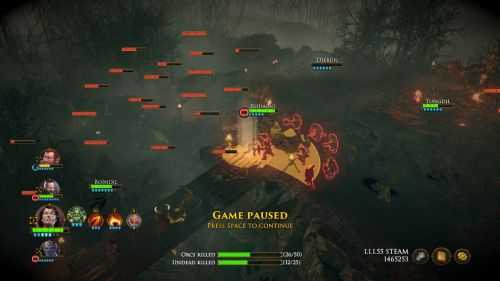
Game-breaks caused HP bars to freeze mid-air, possibly providing some insight into how environments/characters interact.
Freebird, Freebird!
The scope of The Dwarves clearly stretched far beyond what it could accomplish. Things like provisions, decisions, the map in general, ‘friends’ meters, and so on and so forth, all hint at a bigger and more interesting game than what it actually had to show. There's definitely good fun found in some of its battles, it's just not worth a big entry price to come and see. The main consistency of The Dwarves is the compelling nature of its story. I’m a cynic when it comes to the fantasy genre, but the game does tell an interesting story and I definitely had a few “whoa!” moments. There is also a grimdarkness to it that should appeal to to the modern fantasy consumer. Where Tolkien-esque battles of fantasy old feel about as violent as a carwash, The Dwarves makes full and oft-realistic use of its harsh setting. A shame the The Dwarves did not get the budget of a Lord of the Rings.
Big-time fans of the novels will probably buy it anyway, but I would only recommend this game at discounted price for a weekend romp through an RPG-lite visual novel with a solid story. I very much hope that the game does well and that we may see the devs someday catch up with its lofty aspirations.
The Dwarves – Review
Playtime: 9 hours (at best)
Engine: Unity Engine 5.4 (fuck)
Crashes: 3-crashes/freezes
Disclaimer: free key
For being cornerstones of the fantasy genre, it is a bit surprising how little ‘play’ Dwarves see in gaming. They’re virtually never main characters and they seem to share the same personality across many mediums: “Oh ho ho, don’t look down at me, I’m an alcoholic blue collar worker from fantasy Alaska, all Elves are East Coast sissies and magic is for Mary Sues.”
World of Warcraft’s demographics show that dwarves are one of the least popular races despite being a mainstay. It’s strange because, in a way, Dwarves are essentially the Navy SEALs of the fantasy genre. They’re always outnumbered and fighting against the odds. One dwarf is worth the lives of a hundred enemies. Well, good news disgusting dwarf-lovers, you now have two Dwarf-games to try out: We are the Dwarves, a quasi-Commandos game based on three dwarves who utilize stealth and surprise to defeat their enemies, and The Dwarves…
Loosely Based on True Events
The setting of The Dwarves comes from a series of novels I’ve not read and never will. However, a little bit of research shows that they’re very popular and that The Dwarves’ plot is virtually identical to the first book, titled, The Dwarves.
You are Tungdil Goldhand, a lone dwarf in the human realm of Ionandar in a world filled with Norse-names or Indian ones spelled backwards. The premise of the story is that you’re an educated blacksmith with zero world experience. Carrying some serious adventure-blue balls, and despite having not slain even a single cellar rat, you happily set out on a delivery quest that goes clear across the entire world.
Without any problems, you deliver the mail and take home a collection of rare baseball stamps. Just kidding, bad guys kill literally everyone you know and love and a crazed Alf is dead-set on culturally enriching the entire neighborhood with greenskins.
Luckily for you, the game’s title is a plurality and you are soon joined by a couple of bros in Boendal and Biondil. With their help, and a bunch of friendly and not so friendly characters to come, you’ll traipse around finding danger and being real reluctant about everything, yet learning a lot in the process, until you finally become an awkward badass who has redeemed himself through gore and violence.
Black Griffin Down
The general conceit of The Dwarves is that you take up to four characters and battle it out with dozens of enemies, using the environment and powerful abilities to even the playing field. While you have potentially up to a dozen or more characters in your party, you only use four in the battles. Each character has a passive and can choose up to three skills from a pool of options. As far as I could tell, characters gained XP regardless of whether or not they participated in the battles so there’s little worry about incidentally leaving some heroes behind in terms of power scale.
Between battles, you are shown a large, 3D map with numerous locations connected by predefined routes. Reminiscent of the original Total War series, your party, enemy parties, and merchants are represented by wooden tokens skirting around the map. Almost the entire story is told from this screen: every town you visit, every camping night, etc., sparks text events that further push the tale. The voice actors are all excellent, passing between the characters and a narrator. The sound and music are spot on, hitting all the cinematic marks established in the Lord of the Rings movies. Production-wise, The Dwarves is excellent. It utilizes the source material very well and if one were to argue the game to be good, it’d be on the merit as a sort of visual novel you get to play.
Wait, argue the game to be good? What does that mean –
Yellow Brick Roads to Nowhere
The Dwarves is an ambitious game and it starts off strong enough: when you initially interact with the map, you’re given the notion that it’s going to play a big part in things to come. You talk to farmers and villagers, interact with merchants, and dodge around roving orc hordes. A lot of these play together, too. Your decisions help set the stage for future events. If you fail to save a town from orcs, you might come across a camp of its refugees at a later junction. But that’s about as far as things go. The map essentially serves as a narrative function to transport you from one area to the next, occasionally peppering story beats and character development.
Decisions you make at the start of the game serve only secondary functions later on (if any at all), and the relevance of orc hordes roving around causing chaos quickly disappears. In fact, about halfway through the game there is a roaming orc horde that doesn’t seem to attack anything at all – it just travels from node to node until you smash it. All other combat occurs through proccing story elements. It’s very reminiscent of Dragon Age where the map displays an implied threat, but in reality leaves a very small impression upon the actual gameplay. You even have “provisions” which initially I took to mean travel demanded a sort of Realms of Arkania preparedness, but instead they simply heal your dudes. They’re also consumed whenever you move, regardless of injuries, and not once did provisions prove to be a factor whatsoever. The map does look nice, though, and it gives a tactile feel of travel that might be missing without it. It’s just that by the game’s end I could hardly find a reason to justify its inclusion.
An Inventory from Hell, the Devil sends his gaer.dsr
From the world map, you organize your party with what might be the worst inventory screen ever. Your entire party is listed horizontally and requires scrolling to see them all. The items are cluttered together seemingly at random. You’d have an easier time shopping at a Cuban gas station than picking through this mess. But it gets worse. Each character can use one item. When you give this item to a character, it slaps the character’s portrait onto the item instead of vice versa. You end up having to scroll through the inventory to see who is assigned what items, or rather by the game’s terms, what item is assigned which character.
The Dwarves advertises itself as an RPG, but it requires some extremely liberal, Steam store-page levels of label abuse for that to make sense. Fighters do not gain armor or weapons and, well, here’s the level-up screen:
Yeah. Each character maxes out at ten levels and are given two abilities from which to choose from. None of the abilities are particularly exciting, typically ranging from AOE, single-target, mobility, and buff/debuff. The inventory, interface, and general “RPG-lite” nature of the game is a high dosage of consolization.
Floating Fantasy
The Dwarves’ combat is mostly as advertised: it’s a whole lot of orcs colliding with a few dwarves and bodies don’t stay grounded for long. When it works, it looks great. You feel a momentum to the crowds of combatants and the weight of your crushing, bashing, upheaving abilities. Characters use abilities on cooldown (the horror) and have a limited amount of regenerating AP that must be expended carefully as your ‘warriors’ are amusingly unthreatening when left without. Action flows in real-time, though you'll often spend most of it pausing to assign orders and activate items.
And everything in The Dwarves is about crowd control. The best of it is knocking enemies off cliffs, obviously, but when high altitudes aren’t available you must commit to bad attitudes (oh god why). Managerial crowd control is necessary to properly batter and bash a group of misunderstood peaceniks. Enemies need to be kept bashed away, off their feet, or stunned so as to prevent your fighters from being overwhelmed. The mechanics to thin out the waves of enemies tie directly into all this CC: viridian villains take extra damage if stunned or are instantly killed if you strike at them while they’re on the ground. Your tougher enemies will be complaining on the forums as you constantly CC them into haplessness. Sometimes you can combine abilities, like bashing enemies into one spot and then gassing them. Sometimes, the chaos of the battles gets too crazy and you accidentally charge off a bridge or smash an allied character in the face.
Unfortunately, it just does not always work.
Most scenarios are simply poorly designed, oddly reminiscent of the sort of amateur attempts found on a Starcraft UMS. The battlefields are short and mowed through all-too quickly. Nice ideas, very poor execution. A great example is a snow map in which there are crevices, cliff sides, fortifications, and an army of orcs crashing down on you. My first few attempts at this map had me desperately using all the resources I had: spreading my dwarves out, using combinations, pausing constantly to queue up new orders. And I failed. Repeatedly. After coasting through so many battles, I thought I’d finally found the point in the game where it was going to turn up the heat.
Then I realized my objective was just to reach the edge of the map. This battlefield was fairly large with three branching points, but I only needed to get to one. So, what did I do? Well, your fighters can naturally push through enemies when they move so I gathered all my dwarves and simply walked through the orc hordes to the exit zone and promptly won. This theme of expedited endings is shockingly constant through The Dwarves. In far too many battles you can shortcut your way to a victory ostensibly due to a lack of foresight by the designers, why else would so many assets go virtually untouched?

Empty spaces as far as the camera lets you see -- sometimes filled with pixel-finding (yes, you heard that right).
The characters themselves also have so little balance done – some are absolute shit while others can carry the team singlehandedly. Combine an all-star team with a few of these wonky scenarios and you can quickly start zooming right through battles (playtime: a generous 9 hours). One feature slotted in seemingly for no reason is a ‘friends’ meter on your characters. Blandly displayed by an undescribed number on the character sheets, if fighters are friendly with one another they’ll acquire AP at a quicker rate. Honestly, I never noticed this having any effect and threw my squads together regardless of their being Facebook friend status. The items and abilities are similarly imbalanced. Some are completely worthless while others are gamebreaking. For example, one character has a single-target, low damage “stab.” For the same amount of AP, you can do an AOE that does damage in a huge cone and simultaneously sends enemies scattering on fire. Letter opener pin prick vs. napalming greenskins. Not once did I find myself weighing out the pros and cons of these things.
Speaking of enemies, there is not much variety on that front. You will mostly face orcs, surprise surprise. The orcs themselves really do not work that hard to differentiate themselves despite an ostensible ranking system. Aside from the larger ogres, I never really found myself identifying specific threats. A few other enemy types appear now and again, but I never noticed. There is a horsey type of enemy that skates across surfaces like a primadonna making the game look real fucking bad. And a couple of bosses that do the same. To the game’s credit, one of the primary villains is spookily imposing, but like a lot of fantasy idiots he’s frequently monologuing in place of murdering.
I so desperately wanted the game to just give me awesome, large, and environmentally varied battlefields to fight and survive on. Unfortunately, most scenarios are condensed into one spot and the few that find ‘range’ probably only feel long by comparison. It would have been well served by the huge scope of, say, a Freedom Force style of map where you travel large distances across varied terrain. Freedom Force had tightly designed resource usage and maps could be genuinely grueling. You’d get to the end of them with a battered squad of heroes, just surviving by the skin of your teeth. The Dwarves frequently fights in a Smash T.V.-esque phonebooth and all too rarely captures a sense of struggle despite, visually, doing a great job of making you feel hopelessly outnumbered. As the game rushes to its conclusion you are given some genuinely chaotic battlefields, but even then it just felt hamstrung. You fight one boss on the edge of a cliff about the size of a shoebox. Because The Dwarves looks its worst on these small-scale fights, this dramatic battle ended up looking more like a grade school play than the bombastic world-changer it was supposed to be.
This is probably a stretch, but I noticed a problem that has plagued the Close Combat series for quite a while: there’s a notable difference between the environment and the units that are on it, leading to oddities in the simulation (in CC, units and environments technically operated on different planes). Because The Dwarves simulates ‘crowds’ of orcs, it has a much worse time really nailing down the feeling of ‘individuals.’ Your fighters can simply ‘push’ through the crowds and, whenever you really zoom in and see the individuals fighting, there’s a lot of floating nonsense going on. A dwarf cleaving a dozen orcs through the air: looks great as any nuance of physics is lost in the spectacle. Your four dwarves trying to attack one enemy, and then bouncing off one another: looks like piglets fighting to suck on a sow.
Before or after a battle you are treated to the map of the area through which you must hunt for keymarks to lead to the next story-action. You'll often press through these areas waving the cursor around like a minesweeper. While walk-abouts sometimes serve to give you pretty cool environments to look at, they're fundamentally annoying and don't feel like they should be in the game at all. At one point, I walked around a big empty map looking for something to click on only to find the object in a cluttered encampment that I had already walked by. Perhaps it would have been better to have characters automatically notice quest-centric indicators like this instead of leaving it to pixel-hunting players. The game's already quite short on content so have this sort of "gameplay" find its way in is very disappointing.
Just fuck my framerate up, fam
The Unity Engine probably has a lot to do with this, that damned piece of shit. To the devs credit, the environments in The Dwarves appear alright despite the polygon count making them look like someone shot a firehose inside a playdoh factory. Every artist and animator should be proud with what they have done. That said, there is a lack of synergy between gameplay mechanics and the environments. While you can satisfyingly knock enemies off edges, it almost always looks awkward as hell. Enemies tend to ACME freeze frame mid-air and waffle on the merits of gravity as they reluctantly plummet. Sometimes the environments don’t even make sense. At one point, I was on a wooden bridge doing my best Babe Ruth impression just smashing orcs left and right. The problem is that the drop off from the bridge went into a creek which shouldn’t be too hard to crawl back out of, but to the game it may as well have been a dimensional opening into which nothing ever returned. A lot of battles carry this strange islanded sensation that you are battling above a void. This isn’t unusual in games, but damn it is barely concealed here. If you ever run one of your dwarves off an edge, you’ll be treated to the sight of the world’s underbelly as if you just broke the game instead of doing something it was specifically designed to simulate.
But is the Unity Engine to blame for the camera work? The camera is glued to the characters and cannot be panned in freeform. Why they did this is absolutely beyond me (cough, consoles, cough). Remember those “larger” maps I talked about? Yeah, they quickly become a headache when your fighters get spread out enough. A camera flying from side to side is about as comical as you think. One amusing situation I had was that I wanted half my fighters to catch up with the others. So I had to select them, and then, before the camera could pan away, try to click as quickly as I could at the feet of my other fighters. Otherwise I’d have to slow-march them up there (since the camera doesn’t zoom out far enough to do this). I mean, it’s just dumb. And although I asked for much larger maps, they just would not work with this system in place. Also, the camera bumps the environment. One battle started with this camera setup: a vertical view of a staircase with no room to pan because it was backed into a wall. I was getting shot by archers and I couldn’t even pan the camera to figure out where they were!

Game-breaks caused HP bars to freeze mid-air, possibly providing some insight into how environments/characters interact.
Freebird, Freebird!
The scope of The Dwarves clearly stretched far beyond what it could accomplish. Things like provisions, decisions, the map in general, ‘friends’ meters, and so on and so forth, all hint at a bigger and more interesting game than what it actually had to show. There's definitely good fun found in some of its battles, it's just not worth a big entry price to come and see. The main consistency of The Dwarves is the compelling nature of its story. I’m a cynic when it comes to the fantasy genre, but the game does tell an interesting story and I definitely had a few “whoa!” moments. There is also a grimdarkness to it that should appeal to to the modern fantasy consumer. Where Tolkien-esque battles of fantasy old feel about as violent as a carwash, The Dwarves makes full and oft-realistic use of its harsh setting. A shame the The Dwarves did not get the budget of a Lord of the Rings.
Big-time fans of the novels will probably buy it anyway, but I would only recommend this game at discounted price for a weekend romp through an RPG-lite visual novel with a solid story. I very much hope that the game does well and that we may see the devs someday catch up with its lofty aspirations.





